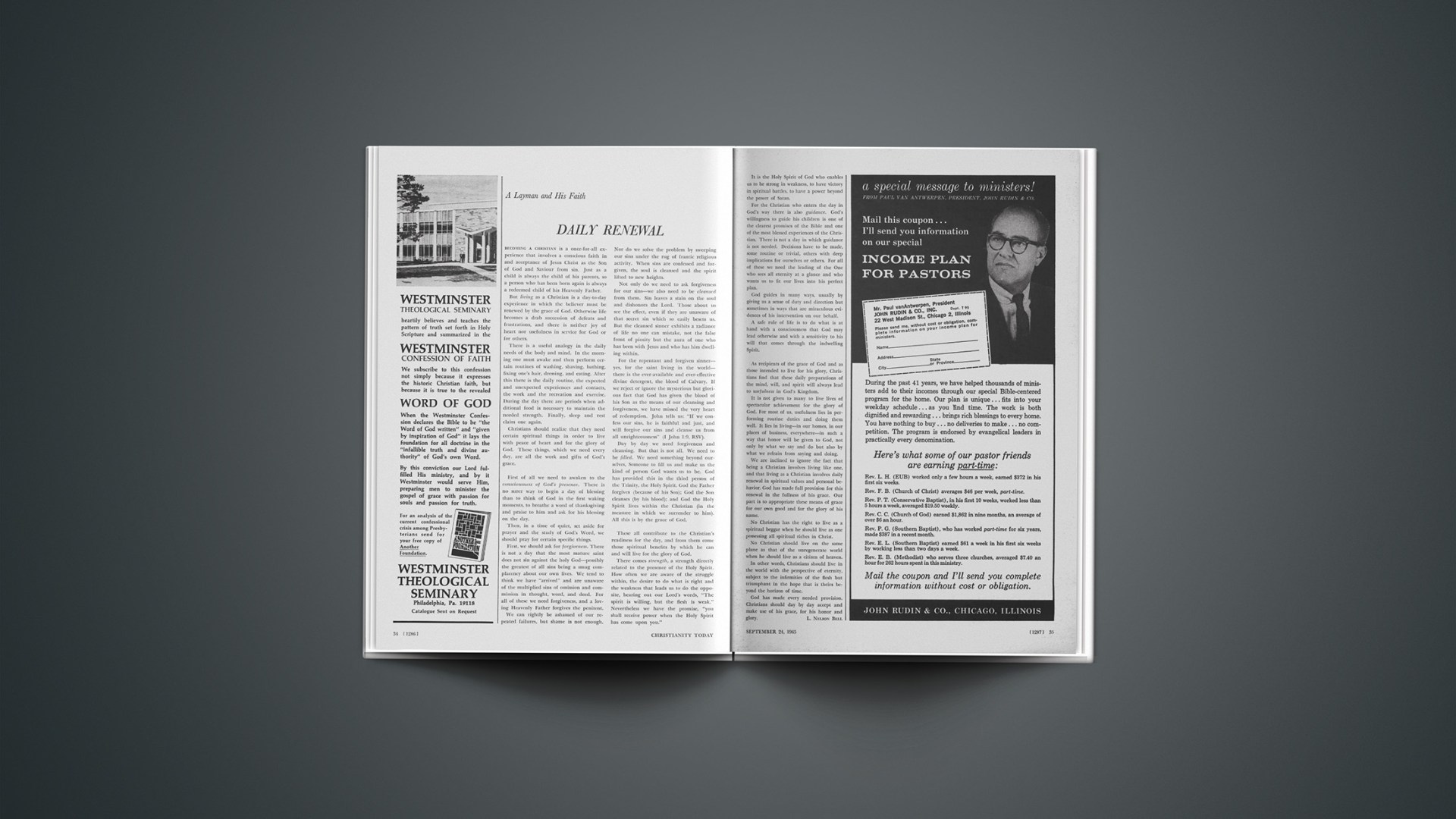Becoming a christian is a once-for-all experience that involves a conscious faith in and acceptance of Jesus Christ as the Son of God and Saviour front sin. Just as a child is always the child of his parents, so a person who has been born again is always a redeemed child of his Heavenly Father.
But living as a Christian is a day-to-day experience in which the believer must be renewed by the grace of God. Otherwise life becomes a drab succession of defeats and frustrations, and there is neither joy of heart nor usefulness in service for God or for others.
There is a useful analogy in the daily needs of the body and mind. In the morning one must awake and then perform certain routines of washing, shaving, bathing, fixing one’s hair, dressing, and eating. After this there is the daily routine, the expected and unexpected experiences and contacts, the work and the recreation and exercise. During the day there are periods when additional food is necessary to maintain the needed strength. Finally, sleep and rest claim one again.
Christians should realize that they need certain spiritual things in order to live with peace of heart and for the glory of God. These things, which we need every day, are all the work and gifts of God’s grace.
First of all we need to awaken to the consciousness of God’s presence. There is no surer way to begin a day of blessing than to think of God in the first waking moments, to breathe a word of thanksgiving and praise to him and ask for his blessing on the day.
Then, in a time of quiet, set aside for prayer and the study of God’s Word, we should pray for certain specific things.
First, we should ask for forgiveness. There is not a day that the most mature saint does not sin against the holy God—possibly the greatest of all sins being a smug complacency about our own lives. We tend to think we have “arrived” and are unaware of the multiplied sins of omission and commission in thought, word, and deed. For all of these we need forgiveness, and a loving Heavenly Father forgives the penitent.
We can rightly be ashamed of our repeated failures, but shame is not enough. Nor do we solve the problem by sweeping our sins under the rug of frantic religious activity. When sins are confessed and forgiven, the soul is cleansed and the spirit lifted to new heights.
Not only do we need to ask forgiveness for our sins—we also need to be cleansed from them. Sin leaves a stain on the soul and dishonors the Lord. Those about us see the effect, even if they are unaware of that secret sin which so easily besets us. But the cleansed sinner exhibits a radiance of life no one can mistake, not the false front of piosity but the aura of one who has been with Jesus and who has him dwelling within.
For the repentant and forgiven sinner—yes, for the saint living in the world—there is the ever-available and ever-effective divine detergent, the blood of Calvary. If we reject or ignore the mysterious but glorious fact that God has given the blood of his Son as the means of our cleansing and forgiveness, we have missed the very heart of redemption. John tells us: “If we confess our sins, he is faithful and just, and will forgive our sins and cleanse us from all unrighteousness” (1 John 1:9, RSV).
Day by day we need forgiveness and cleansing. But that is not all. We need to be filled. We need something beyond ourselves, Someone to fill us and make us the kind of person God wants us to be. God has provided this in the third person of the Trinity, the Holy Spirit. God the Father forgives (because of his Son); God the Son cleanses (by his blood); and God the Holy Spirit lives within the Christian (in the measure in which we surrender to him). All this is by the grace of God.
These all contribute to the Christian’s readiness for the day, and from them come those spiritual benefits by which he can and will live for the glory of God.
There comes strength, a strength directly related to the presence of the Holy Spirit. How often we are aware of the struggle within, the desire to do what is right and the weakness that leads us to do the opposite, bearing out our Lord’s words, “The spirit is willing, but the flesh is weak.” Nevertheless we have the promise, “you shall receive power when the Holy Spirit has come upon you.”
It is the Holy Spirit of God who enables us to be strong in weakness, to have victory in spiritual battles, to have a power beyond the power of Satan.
For the Christian who enters the day in God’s way there is also guidance. God’s willingness to guide his children is one of the clearest promises of the Bible and one of the most blessed experiences of the Christian. There is not a day in which guidance is not needed. Decisions have to be made, some routine or trivial, others with deep implications for ourselves or others. For all of these we need the leading of the One who sees all eternity at a glance and who wants us to fit our lives into his perfect plan.
God guides in many ways, usually by giving us a sense of duty and direction but sometimes in ways that are miraculous evidences of his intervention on our behalf.
A safe rule of life is to do what is at hand with a consciousness that God may lead otherwise and with a sensitivity to his will that comes through the indwelling Spirit.
As recipients of the grace of God and as those intended to live for his glory, Christians find that these daily preparations of the mind, will, and spirit will always lead to usefulness in God’s Kingdom.
It is not given to many to live lives of spectacular achievement for the glory of God. For most of us, usefulness lies in performing routine duties and doing them well. It lies in living—in our homes, in our places of business, everywhere—in such a way that honor will be given to God, not only by what we say and do but also by what we refrain from saying and doing.
We are inclined to ignore the fact that being a Christian involves living like one, and that living as a Christian involves daily renewal in spiritual values and personal behavior. God has made full provision for this renewal in the fullness of his grace. Our part is to appropriate these means of grace for our own good and for the glory of his name.
No Christian has the right to live as a spiritual beggar when he should live as one possessing all spiritual riches in Christ.
No Christian should live on the same plane as that of the unregenerate world when he should live as a citizen of heaven.
In other words, Christians should live in the world with the perspective of eternity, subject to the infirmities of the flesh but triumphant in the hope that is theirs beyond the horizon of time.
God has made every needed provision. Christians should day by day accept and make use of his grace, for his honor and glory.










